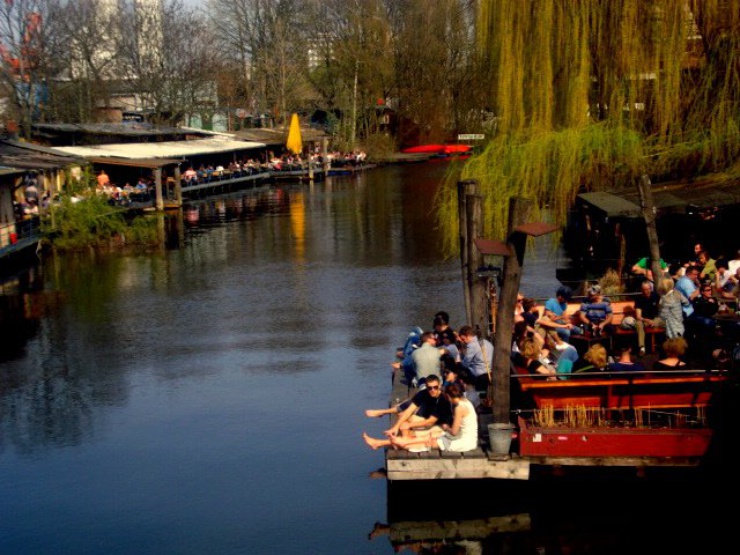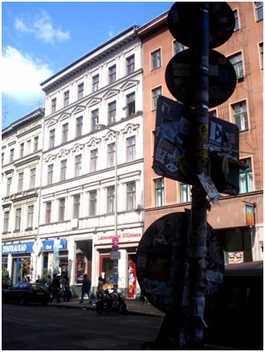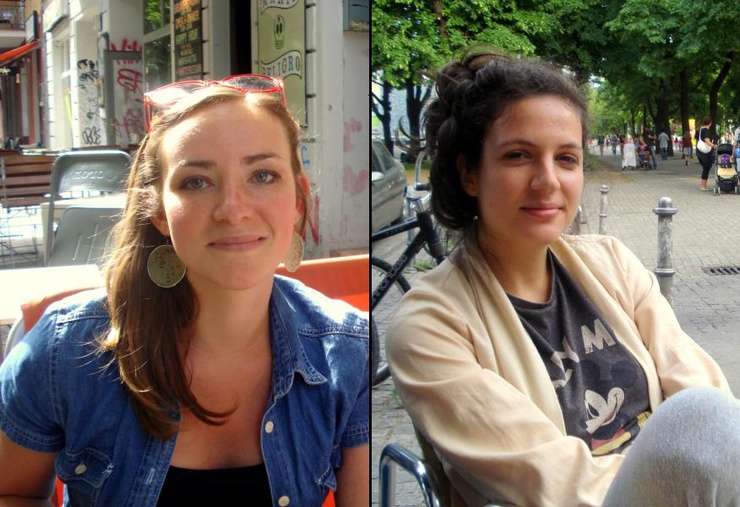
Berlin expats: Spanish, Italian, Greeks go from limbo to limbo
Published on
Translation by:
 hkeet
hkeet
‘I'm not the only one having a hard time in Berlin’, says Marion, a student who has lived in the German capital for a year now. Germany needs immigrants - that's for sure - but in Berlin the rent is on the rise and day jobs are hard to find. Nevertheless, more and more young Europeans are attracted by the city's energy, sometimes at the risk of being left disappointed
In a small courtyard in the Kreuzberg district, youngsters are chatting and smoking under the sun, leaning against the wall or sitting on the large light wooden tables. I hear a mix of German, English, Italian and Spanish. Kay, a German teacher at Babylonia e. V tells me she can’t give me exact numbers but that ‘more and more people come to our German classes, especially Italians, Spanish and Greeks.’ So it's difficult to avoid clichés when it comes to reality.
Babylonia Berlin
I cross the courtyard and come to the entrance of the building which was occupied by the Babylonia association in the 1980s. It now offers language classes as well as help for foreigners in managing the German government's paperwork. When I reach the first floor, I arrive at reception where two people are speaking in Spanish while Kay gives her lesson on the other side of the bay window. Around me, there are posters of protests, one of which is of Kopi, the infamous punk squat in the 1990s on Berlin’s Köpeniker Strasse. In Berlin, Babylonia is a school like no other. Founded in 1981 by immigrants, the prices are reasonable and the lessons are more alternative, based on politics and current affairs. One of the most discussed subjects in classes is the government cutting out the Hartz IV unemployment benefits for new arrivals. This is a governmental policy which primarily targets the first victims of the crisis, namely the Italians, Spanish and Greeks who recently migrated to Germany.

‘Two of my friends, one of whom is Spanish, losttheirHartz IVbenefits,' Elisa, 30, tells me. She is an Italian painter who has been living in Berlin for almost three years. ‘I still have it because I worked in a restaurant. All of the young people who come here work in a restaurant! But even with Hartz IV, it's difficult because the payments are irregular – sometimes I have to wait two months to receive it.’ The brunette is attending lessons at Babylonia and dreams of opening a gallery in Berlin. ‘There is more freedom here than elsewhere and the people are very open,’ she adds.
Prices on the rise, yet wages are not
This is not the case for Paco*, who wants to leave the city. ‘There are a lot of things in this city that I don't like,' he says. 'I've had unpleasant personal experiences here. I knew Berlin was poor before I arrived. It's easy to have fun, but it really takes time to feel integrated.’ The 31-year old from Barcelona has been living in the capital for a year. ‘If I want to stay, I need to do a lot of apprenticeships because my work experience in Spain doesn't count here. But I can't go back to my country either, there's no more work.’ ‘Cornered’ is how Dafni, a 29-year old designer who is originally from Athens, feels. ‘I can't go back to Greece because of the crisis,' she says. 'I need to decide if I want to stay or leave, but I don't know what to do yet. Sometimes I like this city because I can find a balance between a big city and a quieter city. Other times I don't like it because if you don't speak German it takes time to feel like a part of the city, especially if you don't belong to any specific group.’
 Enticed by Germany's good economic health, Europeans are flocking ever more frequently to the capital, causing a rise in rent prices in certain districts. ‘It is a very relaxed way of life; you can do lots of things with little money,’ says Alina, a 25-year old Greek who is studying design, at a café in Kreuzberg. ‘But this is going to change; the prices are rising very quickly, except for in the bars. It's more difficult to go back. It's also increasingly difficult to find an apartment. Especially in Kreuzberg, there's nothing left to rent for under 400 euros (320 pounds). This was unimaginable two years ago.’ With the infamous ‘gentrification’ and the increase in demand, Berlin has seen a real surge in prices in the last two years. It can take months to find a place to rent. Marcel Krueger, a German who has lived in Ireland, tells us how looking for an apartment in Berlin is not easy or very affordable. ‘The average rental price has increased by 7.9% within two years, sometimes more in the ‘trendy’ zones of Kreuzberg, Prenzlauer Berg and Neukölln.’
Enticed by Germany's good economic health, Europeans are flocking ever more frequently to the capital, causing a rise in rent prices in certain districts. ‘It is a very relaxed way of life; you can do lots of things with little money,’ says Alina, a 25-year old Greek who is studying design, at a café in Kreuzberg. ‘But this is going to change; the prices are rising very quickly, except for in the bars. It's more difficult to go back. It's also increasingly difficult to find an apartment. Especially in Kreuzberg, there's nothing left to rent for under 400 euros (320 pounds). This was unimaginable two years ago.’ With the infamous ‘gentrification’ and the increase in demand, Berlin has seen a real surge in prices in the last two years. It can take months to find a place to rent. Marcel Krueger, a German who has lived in Ireland, tells us how looking for an apartment in Berlin is not easy or very affordable. ‘The average rental price has increased by 7.9% within two years, sometimes more in the ‘trendy’ zones of Kreuzberg, Prenzlauer Berg and Neukölln.’
A city for finding yourself?
What’s more, the job market is not in the new arrivals' favour. Manon, a young French artist and blogger, was forced to leave Berlin in 2011, when people ‘accumulated odd jobs’, she writes in her blog. ‘The minimum wage does not exist in Germany, which makes the appalling economic situation in Berlin worse – waiting staff are on four euros (three pounds) an hour. They are often forced to leave their tips with their boss, who tells them that ‘if you don't like it, there are fifteen people queuing in line for this job.’ In other words, if you are an artist, freelance, lost and broke and you want to be renting a shared place until you're thirty, then Berlin might suit you. ‘Many people arrive in Berlin without any plans,’ says Amelia, a 28-year old Italian studying for her PhD. ‘I arrived here at a point in my life when I didn't know what to do. People really make the most of life, but I don't know if I really want that. I want to do something stable. You can't achieve anything here.’

Berlin is known for its status as the city where artists lacking inspiration reside. They live in the German capital not so much to do something tangible but to regain energy. Night falls after the ‘carnival of cultures’ (Karneval der Kulturen). Next to a hippy van, two people are talking about Berlin. One of them was born here. The other, Axel, is a 29-year old Frenchman who has been living in the capital for seven years. For the first guy, Berlin is not the city people dream of; the people who come ‘follow a superficial wave’ that is beyond reality. For Axel, this city is the landmark for young people who are looking for meaning in their life. He learned German on the job, has become a teacher and has succeeded in finding himself. Because beyond reality, Berlin is appreciated for what it has buckets of – energy, space and time. Besides, many others have managed to get something out of the Berlin limbo.
* the name has been changed
This article is part of the seventh edition in cafebabel.com’s 2012 feature focus series on multiculturalism in Europe. Many thanks to the team at cafebabel.com Berlin
Images: main (cc) johncarleton/ flickr (his work is on Getty Image); in-text © Marine Leduc
Translated from Berlin et les jeunes expats : juste une illusion ?


